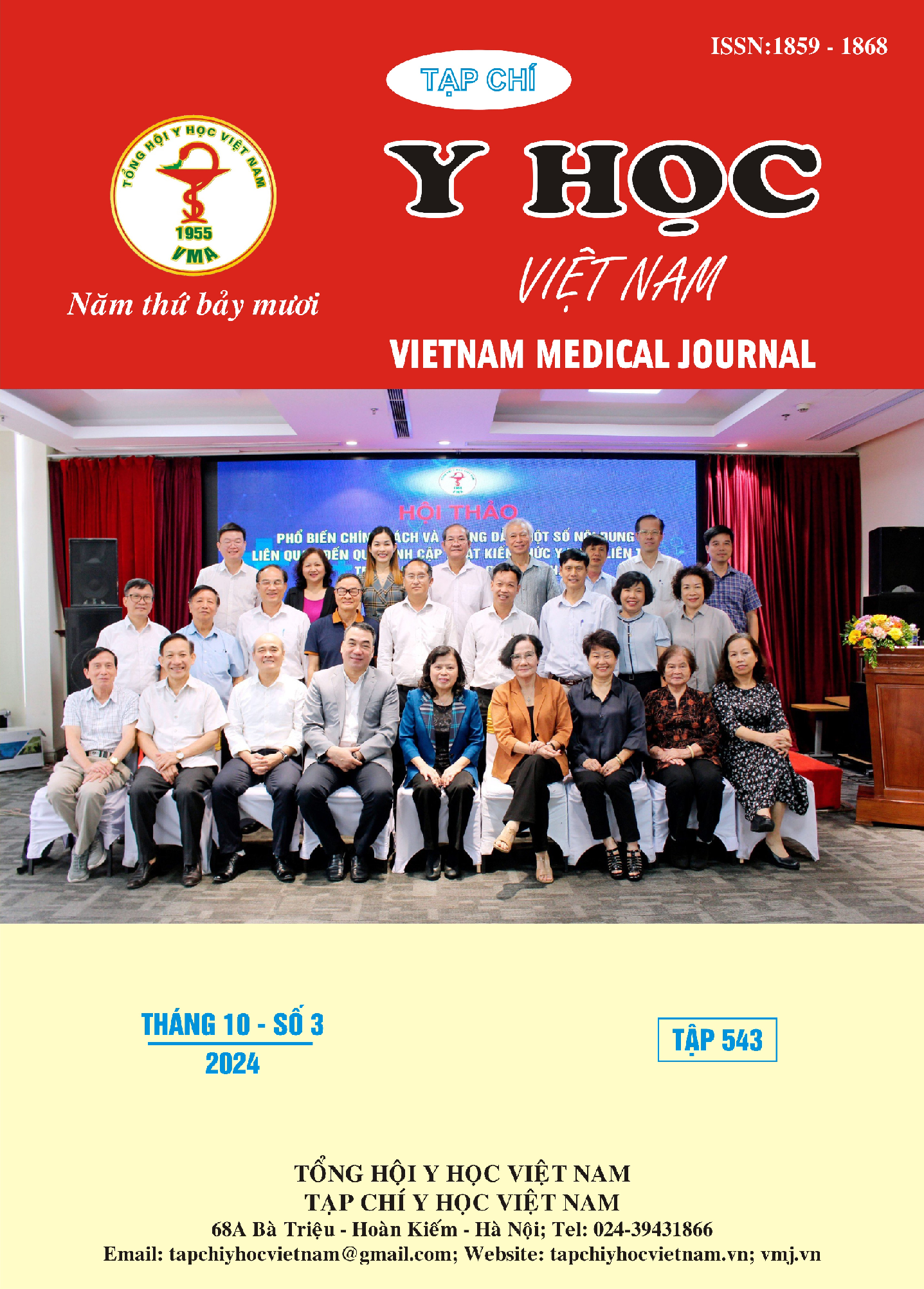KẾT QUẢ ĐIỀU TRỊ U NGUYÊN BÀO THẦN KINH ĐỆM TẠI BỆNH VIỆN TRUNG ƯƠNG QUÂN ĐỘI 108
Nội dung chính của bài viết
Tóm tắt
Mục tiêu: Đánh giá kết quả điều trị u nguyên bào thần kinh đệm tại Bệnh viện Trung ương Quân đội 108. Đối tượng và phương pháp: Nghiên cứu mô tả hồi cứu trên 79 bệnh nhân U nguyên bào thần kinh đệm (GBM) từ 1/2018 đến 12/2023, được phẫu thuật, hóa xạ trị, hóa trị bổ trợ theo sau. Kết quả: Trong nghiên cứu có 28/79 (35,4%) bệnh nhân được phẫu thuật cắt u toàn bộ, 19% cắt gần toàn bộ, 34,2% cắt một phần, 11,4% chỉ sinh thiết tổn thương. Tình trạng methyl hóa gen MGMT phát hiện trên 12/33 (36,4%), 16/43 (37,2%) có đột biến gen IDH1. Thời gian sống thêm toàn bộ (OS) và sống thêm không tiến triển (PFS) trung vị lần lượt là 20 tháng và 15 tháng. Tại thời điểm 1 năm và 2 năm, tỷ lệ OS lần lượt là 84,5%, và 36,2%, PFS là 60% và 19,5 %. Phân tích OS, PFS trung vị của nhóm bệnh nhân có tình trạng Methyl hóa MGMT cao hơn có ý nghĩa so với nhóm không methyl hóa MGMT (OS 36 tháng và 16 tháng (p= 0,003), PFS 22 tháng và 12 tháng (p=0,018)). OS trung vị của nhóm cắt toàn bộ u hoặc gần toàn bộ u là 24 tháng, nhóm cắt được một phần hay chỉ sinh thiết u là 17 tháng (p=0,012). PFS giữa 2 nhóm lần lượt là 17 tháng và 11 tháng, (p= 0,023). OS trung vị của nhóm có chỉ số RPA 3+4 và nhóm RPA 5+6 là 21 tháng và 15 tháng (p=0,016). Tác dụng không mong muốn độ 3,4 chỉ gặp ở 2 bệnh nhân có tăng men gan GOT/GPT (2,5%), và 2 bệnh nhân có hạ bạch cầu, tiểu cầu độ 3,4, còn lại hầu hết là độ 1, 2. Kết luận: Nghiên cứu đã cho thấy phác đồ phẫu thuật kết hợp hóa xạ trị theo sau vẫn là phác đồ tiêu chuẩn, an toàn dung nạp tốt cho các bệnh nhân GBM. Nghiên cứu cũng cho thấy tình trạng Methyl hóa MGMT, mức độ phẫu thuật cắt u, chỉ số RPA có ảnh hưởng ý nghĩa tới thời gian sống thêm OS, PFS
Chi tiết bài viết
Từ khóa
u nguyên bào thần kinh đệm, methyl hóa MGMT, RPA
Tài liệu tham khảo
2. Binabaj, M.M.; Bahrami, A.; et al. The Prognostic Value of MGMT Promoter Methylation in Glioblastoma: A Meta-Analysis of Clinical Trials. J. Cell. Physiol. 2018, 233, 378–386.
3. Hegi ME, Diserens AC, Gorlia T, et al. MGMT gene silencing and benefit from temozolomide in glioblastoma. N Engl J Med 2005;352:997–1003.
4. Lai A, Tran A, Nghiemphu PL, et al. Phase II study of bevacizumab plus temozolomide during and after radiation therapy for patients with newly diagnosed glioblastoma multiforme. J Clin Oncol 2011;29:142–8.
5. Roh et al. Long-term outcomes of concomitant chemoradiotherapy with temozolomide for newly diagnosed glioblastoma patients. Medicine (2017) 96:27
6. Stupp R, Hegi ME, Mason WP, et al. Effects of radiotherapy with concomitant and adjuvant temozolomide versus radiotherapy alone on survival in glioblastoma in a randomised phase III study: 5-year analysis of the EORTC-NCIC trial. Lancet Oncol 2009;10:459–66.
7. Stupp R, Mason WP, van den Bent MJ, et al. Radiotherapy plus concomitant and adjuvant temozolomide for glioblastoma. N Engl J Med 2005;352:987–96.
8. Salvatore Parisiet al. Temozolomide and Radiotherapy versus Radiotherapy Alone in High Grade Gliomas: A Very Long Term Comparative Study and Literature Review.
9. Szylberg, M.; Sokal, P, et al. MGMT Promoter Methylation as a Prognostic Factor in Primary Glioblastoma: A Single-Institution Observational Study. Biomedicines 2022, 10, 2030.
10. Yuan, G.; Niu, L.; Zhang, Y.; et al. Defining Optimal Cutoff Value of MGMT Promoter Methylation by ROC Analysis for Clinical Setting in Glioblastoma Patients. J. Neurooncol. 2017, 133, 193–201. [CrossRef] [PubMed]


